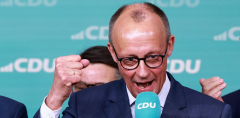With the social democrat Olaf Scholz conceding defeat to the centre right in Germany’s election, the man most likely to be named the next chancellor will be Christian Democratic Union (CDU) leader Friedrich Merz.
The CDU has emerged as the largest party with the far-right Alternative for Germany (AfD) second – its best-ever result in a federal election.
Merz will have to assemble a coalition government, which will involve some tough negotiations, but Europe’s leaders can be expected to treat him as a “chancellor in waiting”. Here are eight things to know about the man about to take one of the most important political positions in Europe.
1. He’s taking his party further to the right
The first thing you need to know about Merz is that he and former chancellor Angela Merkel were longstanding rivals and sparring partners. Back in the early 2000s, after Merkel became leader of the CDU, she ousted Merz from his role as the party’s parliamentary leader, taking on the role herself.
Merkel never made Merz a minister, and indeed he decided not to run for parliament again in 2009, having already begun to focus on his various private sector interests (as a lawyer but also a company board member). Merz was critical of Merkel’s decision to shift the CDU to the centre ground and was concerned it would open up space for the AfD to move into.
Read more:
What is the AfD? Germany’s far-right party, explained
When Merz did become party leader in 2022, he began rewriting of the party’s programme in a much more conservative direction.
2. He’s an economic liberal
Merz takes a very different economic view to Merkel, at least in the latter years of her chancellorship. In 2003, he argued for a radical simplification of Germany’s tax rules such that a tax return could be calculated on the back of a beer mat.
His party’s 2025 manifesto argued for deregulation and tax cuts to boost Germany’s sluggish growth. Part of this, Merz argued, should be funded by more conditionality being applied to welfare recipients, with a complete stop on benefits for recipients who refused to take any form of work on. In 2024, he also said he’d do “everything” to stop the EU taking on common debt.
3. He’s a social conservative
In his younger years, Merz was in the Catholic youth movement. He has a record of voting against abortion and has made a few awkward comments about homosexuality (saying of Klaus Wowereit, a gay mayor of Berlin, “I don’t mind as long as he doesn’t come near me”). In a strange comment, he once referred to his wife and daughters as evidence he didn’t have a problem with women. In a TV debate with Scholz, Merz was asked about Donald Trump’s recognition of only two genders, and reacted: “You can understand his position.”
In 2000, Merz spoke of a German Leitkultur (loosely, “leading culture”, as contrasted with “multiculturalism”) – a term now in common parlance in Merz’s CDU.
4. He’s a transatlantacist
From 2009 to 2019, Merz chaired the Atlantic Bridge, a prominent German organisation devoted to strengthening relations between Germany and the US. He is a transatlanticist by instinct and recently sent a hand-written note to Donald Trump congratulating him on his election, noting his “strong mandate for leadership”. However, in a statement on election night, Merz pledged to “achieve independence” from the US and recognised that Trump is “largely indifferent” to Europe’s fate.
5. He’s pro-European
With some caveat





